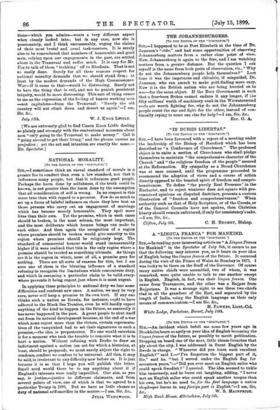NATIONAL MORALITY.
[To THE EDITOR OF THE "SPECTATOR:']
sometimes think an unreal standard of morals is a greater foe to conduct than even a low standard, not that it influences many people, but that it influences good people. Perhaps the harm done by selfishness, if the truth could be known, is not greater than the harm done by the assumption that all consideration of self is wrong. In no respect is this more true than with regard to a promise. Few do so much to Bet up a focus of baleful influence on those they love best as those persons who carry out an engagement of marriage which has become merely honourable. They spoil more lives than their own. Yet the promise, which in such cases should be broken, is the most solemn, the most important, and the most deliberate which human beings can make to each other. And then again the recognition of a region where promises should be broken would give sanctity to the region where promises should be religiously kept. The standard of commercial honour would stand immeasurably higher if it were realised that this is the only region where a promise should be treated as something ultimate. As things are it is the region in which, most of all, a promise goes for nothing. There are all sorts of reasons for this, but I am sure one of them is the blunting influence of a standard refusing to recognise the limitations which concentrate duty, and which in assuming a particular claim to be valid every- where prevents it being cogent just where it is most urgent.
In applying these principles to national duty we lose some difficulties and confront new ones. A nation, we may be very sure, never will keep a promise to its own hurt. If any one thinks such a nation as Russia, for instance, ought to have adhered to the Black Sea Treaties, even he will hardly expect anything of the kind to happen in the future, as assuredly it has never happened in the past. A great people to shut itself out from its natural development because, at the end of a war which none regret more than the victors, certain representa- tives of the vanquished had to set their signatures to such a promise,—the idea is preposterous. No one would entertain it for a moment who took the trouble to conceive what it is to hurt a nation. Without refusing with Burke to draw an indictment against a nation (an act for which a historian, at least, should be prepared), we must surely abjure the right to condemn conduct we confess to be universal. All this, it may be said, is irrelevant to any difficulty now before us. It is just because it is so that I hope you will publish this letter. Small need would there be to say anything about it if England's interests were really imperilled. Our aim, as you say, is justice,—justice to different claimants, and from several points of view, one of which is that we agreed to a particular Treaty in 1881. But we have as little chance as duty of national self-sacrifice in the matter.—I am, Sir, 8:e.,
JULIA 'WEDGWOOD.






































 Previous page
Previous page